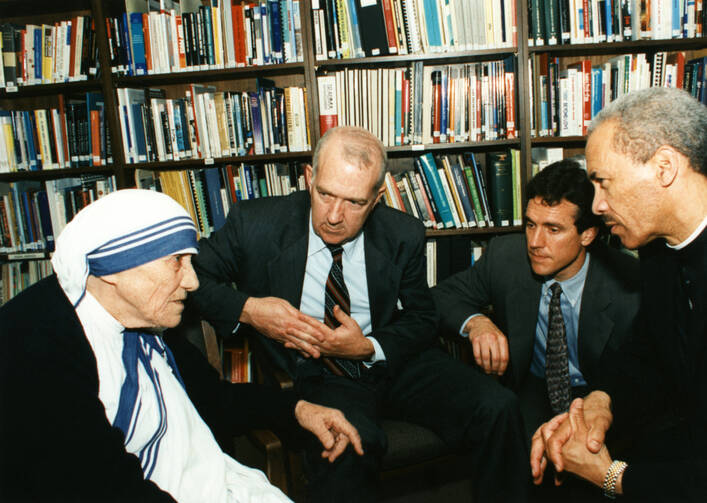If there is one person who immersed herself in the "peripheries" Pope Francis is drawn to, it was Blessed Teresa of Kolkata.
If there was one who showed courage and creativity in bringing God's mercy to the world, like Pope Francis urges, it was the diminutive founder of the Missionaries of Charity.
For many people, the Catholic Church's Year of Mercy will reach its culmination when Pope Francis canonizes Mother Teresa Sept. 4, recognizing the holiness of charity, mercy and courage found in a package just 5-feet tall.
Ken Hackett, U.S. ambassador to the Holy See, worked closely with Mother Teresa and the Missionaries of Charity in his previous positions at the U.S. bishops' Catholic Relief Services. He was at her funeral in 1997, her beatification in 2003 and will attend the Mass where she will be declared a saint.
"Where Mother pushed the Missionaries of Charity was to the edge, to the most difficult places," said the ambassador, who said he visited her houses "all the time, everywhere."
"They were always way out there, both geographically and with the people who absolutely fell through the cracks," he said. Mother Teresa opened homes in Ethiopia during the communist military dictatorship, in the most destitute neighborhoods of Haiti's capital, in Rwanda after the genocide and in Yemen, where four Missionaries of Charity were murdered in March.
"When there was war, when there was fighting, there they were," Hackett said. "They stayed."
Mother Teresa demonstrated that living a life committed to mercy took "selflessness and courage," he said.
Her courage also was demonstrated in her ability to "speak truth to power," he said. Mother Teresa visited the United States regularly, speaking to Catholic groups, opening homes and meeting with presidents, including Ronald Reagan, George Bush and Bill Clinton. "She was straight out against abortion," the ambassador said. "From conception to death—she was the whole thing and didn't pull any punches."
Like Pope Francis, he said, Mother Teresa drew energy from personal, one-on-one contact with people and consciously chose to live as simply as the poor she befriended and tended.
In life and after her death, Mother Teresa faced criticism for not using her fame and contacts to advocate more directly for social and political change to improve the lives of the poor she served.
"You can find all the things she wasn't," the ambassador said, "but what she was was much more important than what she wasn't. She was a model and now she will be a saint."
Valeria Martano, Asia coordinator for the Community of Sant'Egidio, said, "We are talking about a woman who broke out of the existing framework of what was expected of a Catholic woman in the 1940s. And, like Pope Francis, she chose to make her life a denunciation" of injustice. "Her witness was testimony that things can change. She did not speak of justice so much as do justice."
"Mother Teresa chose to understand the world through the eyes of the least of the least, what Pope Francis would call the periphery," said Martano, who also leads Sant'Egidio programs in the poorest neighborhoods on the southern edge of Rome.
But it is not just about "going out," Martano said. For both Pope Francis and Mother Teresa, she said, everything starts with prayer.
The founder of the Missionaries of Charity insisted that she and her sisters were "contemplatives in the midst of the world," she said. "It was not just about doing." Mother Teresa's prayer took her to the periphery and the peripheries were key to her prayer.
"What Mother Teresa lived, Pope Francis teaches constantly: compassion in the face of pain and never accepting indifference in the face of suffering," said Archbishop Matteo Zuppi of Bologna, Italy.
For the archbishop, Mother Teresa modeled "a church close to the poor, a church that is mother to the poor and that lives the joy of serving the poor."
Revelations after her death that she suffered a "dark night of the soul," decades of feeling abandoned by God, are for Archbishop Zuppi a further sign of her deep immersion in the lives of the poor and forgotten.
"Her spiritual director would say that thirst is knowing there is water and longing for it," he said. "She was a woman who made the thirst of Christ on the cross her own. She lived that thirst."








